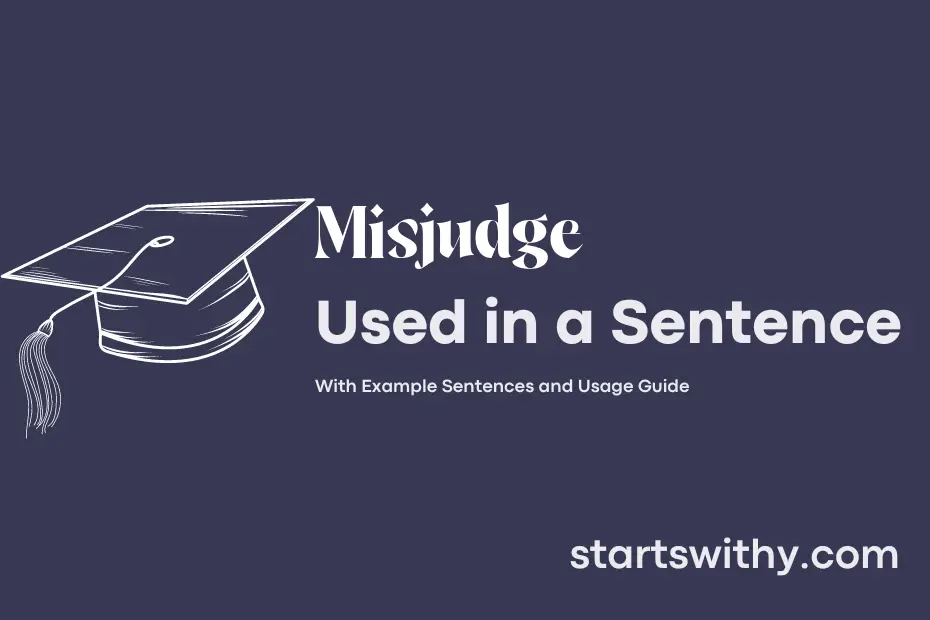Have you ever misjudged someone based on their appearance? To misjudge means to form an incorrect or unfair opinion about someone or something without fully understanding the situation.
Misjudging can lead to misunderstandings and missed opportunities for genuine connections. It is important to approach each individual with an open mind and withhold judgment until you have a better understanding of their character and intentions.
7 Examples Of Misjudge Used In a Sentence For Kids
- You should not misjudge someone by their appearance.
- It is important to not misjudge others without knowing them well.
- Do not misjudge a book by its cover, give it a chance.
- Sometimes we can misjudge situations, so it’s okay to ask for help.
- We should always think carefully before we misjudge someone.
- It is not nice to misjudge others without understanding their feelings.
- Remember, it’s not good to misjudge a person based on rumors.
14 Sentences with Misjudge Examples
- Misjudge the difficulty level of your upcoming exams and end up not studying enough.
- Don’t misjudge the importance of participating in extracurricular activities for a well-rounded college experience.
- It’s easy to misjudge the amount of time it takes to complete assignments, so start them early.
- Don’t misjudge the impact of networking with your classmates and professors for future opportunities.
- Taking on too many responsibilities can lead you to misjudge how much time you have for studying.
- It’s important not to misjudge the value of seeking help from counselors or tutors when struggling academically.
- Comparing yourself to others can lead you to misjudge your own abilities and accomplishments.
- Balancing academics and social life can be challenging if you misjudge your time management skills.
- When seeking advice from seniors, be cautious not to misjudge their perspectives based on their experiences.
- Choosing a major solely based on job prospects can cause you to misjudge your passion for the field.
- Don’t misjudge the benefits of maintaining a healthy lifestyle during your college years.
- Peer pressure can make you misjudge your limits when it comes to substance abuse.
- Be mindful not to misjudge the impact of online distractions on your study habits.
- It’s easy to misjudge the consequences of plagiarism, so always cite your sources properly.
How To Use Misjudge in Sentences?
To Misjudge is to make an incorrect or mistaken assessment of someone or something. When using this word in a sentence, it is important to consider the context and ensure it is used correctly.
Here is an example of how to use Misjudge in a sentence:
- “I misjudged her abilities and didn’t think she could complete the project, but she surprised me by finishing it ahead of schedule.”
When incorporating Misjudge into a sentence, it is essential to remember that it implies an error in judgment. You can misjudge someone’s character, intentions, skills, or any other aspect that requires a thoughtful assessment.
It is advisable to use Misjudge when you want to emphasize a discrepancy between your initial assessment and the actual situation. Whether it involves underestimating or overestimating someone or something, the word Misjudge is meant to convey the idea of being mistaken in your judgment.
Practice using Misjudge in different contexts to become more familiar with its meaning and usage. By incorporating it naturally into your everyday language, you will improve your vocabulary and communication skills. Remember to pay attention to how others use the word so you can continue to expand your understanding of its nuances.
Conclusion
In conclusion, the examples of sentences with “misjudge” highlight the potential for errors in forming opinions or making assumptions. It serves as a reminder that misjudging someone or a situation can lead to misunderstandings and unfair treatment. Being mindful of our own biases and giving others the benefit of the doubt can help prevent misjudgments.
These sentences underscore the importance of practicing empathy, open-mindedness, and communication to avoid misjudging others. By actively seeking to understand different perspectives and being willing to reassess our initial impressions, we can foster better relationships and create a more inclusive and harmonious environment. Remembering that everyone has their own unique experiences and motivations can help us avoid the pitfalls of misjudging others.



